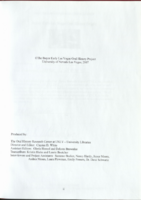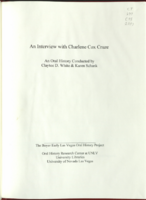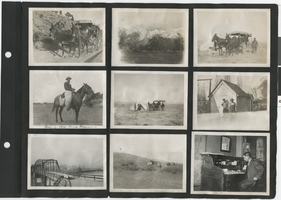Search the Special Collections and Archives Portal
Search Results

Transcript of interview with Leain Vashon by Claytee D. White, July 29, 2014
Date
2014-07-29
Archival Collection
Description
Leain Vashon educated his three children, taken care of any family medical challenge, purchased property, and lived the American Dream because of the Culinary Workers Union Local 226. As a dedicated union man, he has volunteered as shop steward, committee member, organizer, volunteer organizer, and Vice President, an elected position. His children have walked picket lines since five and six years of age. They know the value of their father’s job and his activism in the labor movement. They know that they can be anything they desire. Vashon sees the future as: “The pension that we're going to have is going to be the best pension in the United States. The livable wage we have is going to be some of the highest. The healthcare that we have is going to be one of the best. We are going to insist on those things. We are not going to go backwards. We're not going to go anywhere. The jobs that we do inside the hotel are going to continue to carry dignity. We are going to continue to be the best workers and we are going to give the corporations and the hotels the best that we have to offer. We're going to be great workers. And by having great workers, you are going to have guests who are satisfied because that's the link, how satisfied your worker is and how satisfied your guest is. If every CEO up and down the Strip knew that our fights would be minimal. You take care of the worker; they'll take care of your guest, …and you're going to have the best thing that you can have, which is return guests.”
Text

Transcript of interview with Alan Feldman by Claytee White, September 24, 2014
Date
2014-09-24
Archival Collection
Description
Alan Feldman fell in love with Las Vegas because of the Siegfried & Roy show at the Frontier. After the opening illusion, Crystal Chamber, “I don’t remember breathing.” Feldman grew up in a home with a creative father who was a self-trained musicologist and expert on Paul Robeson. His mother worked as a bookkeeper so Alan was encouraged to be grounded and to soar. As a theater major at UCLA, he was encouraged to hone his Public Relations skills. That expertise brought him to Las Vegas and to Steve Wynn and to work toward a changing relationship with the Culinary Workers Union Local 226. His work here has been life changing; management and labor did not have to fight at the end of each contract. He speaks of the changed understanding in this way: “…we also wanted to make a better product, and in making a better product we needed the employees to step up. Because if you are going to put five million dollars into a restaurant in 1990 where prior to that the most anyone had ever spent was a million, if you were going to tell the world come to Las Vegas because the experience is better, then the experience needed to be better. Maybe this is the part of Steve that he does deserve credit for, although, again, I think it's more—no, he's not alone now and folks like Jim Murren have absolutely taken up this same kind of notion. The building doesn't deliver your bags. The building doesn't hand you the meal. The building doesn't take your order. So great, you've got a volcano and you've got fountains and you've got stunning architecture. Fantastic. But if you don't have a smile on your face when you're welcoming someone to the hotel, it sucks and the rest of it doesn't matter.”
Text

Transcript of interview with Unite Here Bartenders Union Local 165 by Claytee D. White, September 29, 2014
Date
2014-09-29
Archival Collection
Description
Rosemary Christian, David Peinado, Dale Pryor, Virginia Velasquez, and Greg Venezia are among the elite of Las Vegas bartenders. The bars that they work and have worked span from one end of the Strip to the other; the original Aladdin, The Silver Slipper, O’Sheas, the Monte Carlo, Slots ‘A’ Fun, the Luxor, Caesars Palace, and the Rio. Their stories take us from family ownership to corporate. Families allowed all casino bars to be set up in an identical fashion, each type of glass and each liquor bottle was set in the same location all over town. A bartender could walk into a new location and start work without a moment’s hesitation. Corporate thinking changed that need for an outside bartender to work in random places. When women began in this lucrative field, tension occurred but lessened as men recognized that women could lug beer kegs with the best of them and they could easily calm down a drunkard using her womanly touch. The thread throughout this roundtable discussion sews together the exceptional lives of these five bartenders with their membership in UNITE HERE Bartenders Union Local 165. In conjunction with the Culinary Workers Union Local 226, insurance, wages, job satisfaction, uniforms, giving back to the Las Vegas community, and many other benefits occur, seemingly, without effort. “We are skilled craftsmen.” “We have security working for the union and health benefits and a pension. So it's something that's long term. It's longevity working for a union. You know you always have someone backing you.”
Text

Transcript of interview with Dixie and Neil Brundy by Claytee D. White, July 01, 2014
Date
2014-07-01
Archival Collection
Description
Nevadans Dixie Morrison and Neil A. Brundy met in 1959 at a rodeo in St. George, Utah. Born in St. George, Utah, Dixie was raised in Meadow Valley Wash, in Lincoln County, Nevada, on an 800-acre ranch, where she milked cows, barrel-raced, and attend high school via correspondence. Neil lived in Caliente until he was four, when his parents bought ten acres near Rancho Road (US 95) and moved to Las Vegas. Neil attended Fifth Street School, Las Vegas High School, and graduated from Rancho High School’s first graduating class in 1957. The couple married in 1964 in the Little Church of the Flowers and proudly parented six sons. In this interview, the Brundys describe life in rural Nevada and in Las Vegas in the 1940s, 1950s, and 1960s; work on the railroads; barrel-racing; and rodeos. As members of the Church of Jesus Christ of Latter-day Saints, they also talk about their family history work. Their memories evoke the streetscapes of pre- and postwar Las Vegas, its outskirts and downtown; race- and class-based tensions in the schools; the glamour of Las Vegas casinos when they were owned and operated by the mob; and the country music stars who performed downtown. Now residents of Southern Utah, Dixie and Neil come to Las Vegas to hear hardcore rock. Their three youngest sons formed the hardcore rock band, Folsom. When Folsom plays locally the proud parents attend a performance and enjoy family time with their band member sons and the sons and their families who live locally.
Text

Transcript of interview with Dr. John P. Watkins by Claytee D. White, April 29, 2009
Date
2009-04-29
Archival Collection
Description
World War II Naval officer, outdoors man, viola player John Watkins arrived in Las Vegas in 1955 fresh from his fellowship at UCLA, as the town’s first urologist. In this interview made two years before his 2011 death, Watkins talks about his schooling, his medical career, and medicine and medical practitioners in Las Vegas from the mid-1950s. He recalls how he met his wife, Frances (née) O’Rourke, and the Las Vegas places he, Frances, and their sons John and Brian lived. In particular, he describes their Desert Inn Country Club neighbors and neighborhood, where he and his family lived for fourteen years near the third tee. Watkins talks about his musical education and playing the viola in Antonio Morelli’s Christmas concerts. He also shares his experiences as a mountain climber who climbed Mount Charleston several times before deciding in his seventies to climb the highest peak in each of the fifty states. By the time of this interview, he and his son Brian had conquered forty-three state peaks. According to his obituary, he completed one more climb before he died at ninety years of age, for a total of forty-four highest state peaks. In an Appendix, Watkins shares his detailed wartime journal covering nine “terrible days” on a U.S. Naval ship in an undisclosed battle zone in the Pacific Theatre, 28 December 1944 – 6 January 1945.
Text

Transcript of interview with Helen Daseler by Claytee White, October 9, 2007
Date
2007-10-09
Archival Collection
Description
In this interview, Helen Daseler shared memories of mining work in Colorado, living in Europe, and working for the U.S. government, in addition to opening the "Las Vegas Day School". Helen was born in 1929 in Newton, Iowa. She matriculated at George Washington University but earned her degree from the University of California Santa Barbara. After graduation Helen married Jack Daseler who joined the "Lighter-Than- Air Program with the Navy and flew blimps along the Pacific Coast, Atlantic Coast and South America. Later, Jack worked as a teaching principal in France and Germany where their three children were born. Helen and Jack, both certified teachers, moved to Las Vegas, Nevada, 47 years ago and started the Las Vegas Day School in a Unitarian Fellowship building on Bond Road (Tropicana). The initial class started with 14 students. Helen taught kindergarten the first year, and Jack assumed the administrative and management duties. As the nineteen seventies approached, they played a major role with school integration in Las Vegas. Since Jack, the daily operations of the school are performed by the three sons, Neil, Jack, and Frank. Helen is retired and lives in Las Vegas.
Text

Transcript of interview with Charlene Cox Cruze by Claytee D. White and Karen Schank, August 9, 2010
Date
2010-08-09
Archival Collection
Description
The Las Vegas story of Charlene Cox Cruze begins long before she was born in 1941. Her early ancestors had traveled through the area in the 1850s and her grandparents settled in Las Vegas in 1905, the year of incorporation as a town. She is a registered native American and Daughter of the American Revolution. Char recalls growing up in the valley when it had: a "forest of mesquite", plenty of water and atomic bomb tests. Her family's first home was a structure built on a flatbed that her father pulled behind a truck wherever he had work. In this narrative Char touches upon the memories of being a youngster playing in the dust to riding a horse across the desert, swimming in the pool at the Flamingo and seeing celebrities like Elvis Presley and Nat King Cole perform. She also offers her thoughts about the transformation of Las Vegas from a small city to the modern corporate era of the Strip.
Text

Transcript of interview with John Wilhelm by Claytee White, August 12, 2014
Date
2014-08-12
Archival Collection
Description
John Wilhelm, past president of UNITE HERE (Union of Needletrades, Industrial, and Textile Employees and Hotel Employees and Restaurant Employees International Union), settles in at Union headquarters in Las Vegas and recalls highlights from his forty years as a union leader and organizer. After sharing his discontent with his freshman year at Earlham College and Midwestern Quakers, he reveals the curious manner in which Yale University accepted him, how he became a community organizer, and, following graduation, the way he began his union career and his efforts to organize the workers at Yale. He expresses gratitude to his mother for her insistence that he get a good education and to Betsy, his wife of forty-five years, for her unfailing support of his work and the union cause. He also discloses the reasons he commutes between Las Vegas and Santa Barbara, California. After explaining the history of the union in hospitality he speaks to the fluidity of problems with race, gender, and labor with the corporatization of the hospitality industry. He highlights union issues, strikes, and campaigns: arrests, card check, guaranteed work week, Union Again, and Walk and Work. He talks of negotiations with Las Vegas owners or managers like the Binion family, Bill Boyd, the Elardi family, Jackie and Michael Gaughan, Terry Lanni, Bob Maxey, and Steve Wynn. Mostly, he fondly remembers stories of and contributions by union leaders Geoconda Arguello, Jim Arnold, Joe Duarte, Edward T. Hanley, Ardella Roberts, Phil Schloop, Vincent Sirabella, Myra Wolfgang, and Steve Yokich of United Auto Workers. Throughout, his stories involve D. Taylor, who followed Wilhelm as president in 2012. Although he stepped down from the presidency, he continues to work on pension and healthcare issues.
Read More
Text

Photograph album 2, Ferron-Bracken Collection, circa 1905-1935
Date
1905 to 1935
Archival Collection
Description
Photograph album of early Las Vegas.
Image

Transcript of interview with James M. Bonaventure by Claytee D. White, September 9, 2014
Date
2014-09-09
Archival Collection
Description
James “Jim” Bonaventure worked from thirteen years of age, entering the hotel casino industry at sixteen. The weekend buffet at the Hacienda was not his cup of tea but he hit his stride at his second job, the Horseshoe, and stayed there for seven and half years. But it was the work at the Union Hall that he loved. He stayed there for over thirty years developing the grievance department into today’s state-of-the-art entity that negotiates between employees and employers. Bonaventure served on the front lines of major disputes including strikes. In the beginning, the Las Vegas Police Department sided with hotel casino owners but over the years as personnel changed, they became more egalitarian in the treatment of strikers. The 1984 strike was one of the most contentious and up to that time, the largest in the history of the union. More than 17,000 workers walked off their jobs to protest conditions at 32 Hotel Resorts. Arrests were plentiful. As soon as the leadership reached the picket line, they were immediately handcuffed. The bitterness did not end when the 9-month strike concluded. Bonaventure remembers Bally’s putting up $100,000 to fight grievances. Still, the union won 85% of the cases. Then several downtown casinos reared their collective heads. The Golden Gate Hotel and Casino, Las Vegas Club, and the Plaza Hotel Casino were dubbed the Downtown Three. Strained relationships turned into a lawsuit where the Culinary Union was paid $40,000. Then in 1989 Fitzgerald’s Hotel Casino’s actions called for a picket line. Bonaventure and other leaders agreed on a Noise Night. Union member brought pot and pans and banged on them. The night ended with a lawsuit filed by police officers claiming hearing loss. From the bottom of his heart, Bonaventure is a Union Man. It has been his life’s work. He is most proud of and humbled by his work as a trustee of the Culinary Academy of Las Vegas. Anyone can train there for most positions in the hotel industry and be hired into the industry upon graduation. And it’s the place when U.S. citizenship classes are given to all those ready to apply. During this 2014 interview Jim Bonaventure was thinking about retirement or at least slowing down. I would not be surprised if he’s still at his Culinary Workers Union Local 226 desk handling more grievances than anyone else in his department.
Read More
Text
Pagination
Refine my results
Content Type
Creator or Contributor
Subject
Archival Collection
Digital Project
Resource Type
Material Type
Place
Language
Records Classification
